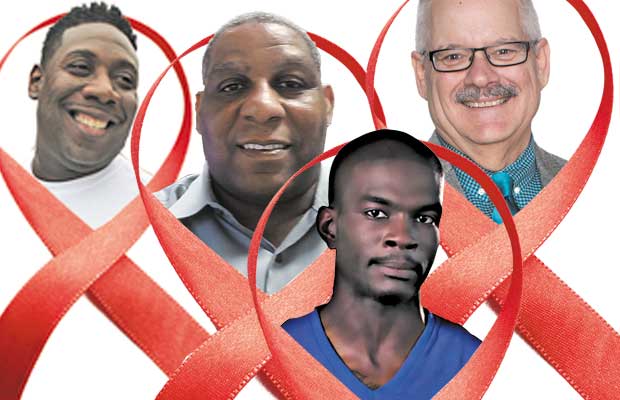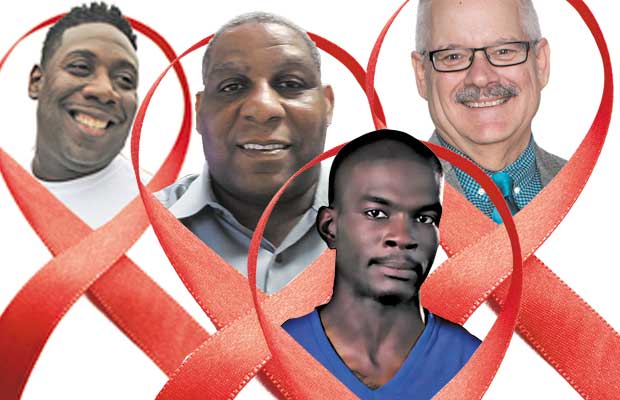
From Left to right, Auntjuan Wiley, Daron Kirven, Melvin Slack and David Hearn.
From Staff Reports
As we mark World AIDS Day 2016, Dallas Voice takes a minute to recognize just a small handful of the people in North Texas that have dedicated themselves to the ongoing fight against HIV/AIDS. Listed below, in alphabetical order, are those DFW Metroplex activists in the LGBT community who have been included in POZ Magazine’s POZ 100 — Celebrating the South.
As you read through the list and honor these people, remember that even though the advent of new medications has turned HIV from a quick death sentence to a chronic but manageable disease for many people, the battle continues.
According to a fact sheet released this month by UNAIDS, 18.2 million worldwide were accessing antiretroviral therapy as of June this year. In 2015, 36.7 million were living with HIV, and 2.1 million were newly-infected with the illness. An estimated 1.1 million people died of AIDS-related illnesses last year.
From the beginning of the AIDS pandemic through the end of 2015, an estimated 78 million people became infected with HIV; of those, about 35 million have died of AIDS-related illness.
According to the Centers for Disease Control, in 2014 an estimated 44,073 people were diagnosed with HIV in the United States. About 1.2 million people in the U.S. were living with HIV by the end of 2012, and about 13 percent did not know they were infected. In 2012, 6,955 people died of HIV/AIDS.
So this year as we mark World AIDS Day, remember: We have to follow the examples of these activists and do more than just light a candle or wear a red ribbon if we want to achieve the goal of an AIDS-free generation.
David Hearn
“People don’t always realize what we do,” David Hearn said recently of the Greg Dolgener Memorial AIDS Fund, the organization he founded to help people with HIV/AIDS meet emergency needs.
The organization — which Hearn founded 20 years ago and named after his late partner, who was an AIDS activist and volunteer until his death in 1994 — donated $1,000 to Resource Center to use in filling empty shelves at the agency’s food pantry for people with HIV/AIDS. GDMAF also donated $1,000 to help repair damage from a fire at Legacy Founders Cottage. “We saw those things as emergency needs,” Hearn said.
But GDMAF’s primary function is to help individuals with HIV/AIDS who have an immediate financial need that other AIDS service organizations are not geared to fill — like money to make repairs to the car that gets that person to and from their job and their doctor appointments, or money to pay rent or utilities if a person comes up short one month.
Hearn said his agency helps between 200 and 250 people a year, and that’s not counting the partners, spouses, children of those people who are also affected by GDMAF’s efforts. Since the organization is totally volunteer and does not have the resources perform intake services and maintain a roster of clients, GDMAF works with “all the major AIDS service agencies” in DFW, asking those agencies to refer clients who need GDMAF’s assistance in emergencies.
“We accept three requests per agency a month. That’s 24 total each month. Sometimes we can help them all, and sometimes we run out of money before the end of the month,” Hearn said. “We do the best we can to help as many people as possible.”
For Hearn — who has lost two partners and 34 friends to AIDS — running the agency that bears the name of his beloved Greg is a labor of love. And his efforts to help those with HIV/AIDS don’t stop with GDMAF. In addition to his role as president and treasurer of GDMAF, Hearn has served on the board of the organization formerly known as AIDS Services of McKinney; he started the MetroBall, GDMAF’s largest annual fundraiser in 2005, and from 2012-2015 served on the board of AIDS Arms. During his time on the AIDS Arms board, Hearn served as chair of the People and Operations Committee, on the Research and Development Committee and on the committee to review the agency’s new marketing direction.
The honors that have come his way because of his work are just icing on the cake. Before he retired from JCPenney, Hearn received the James Cash Penney Award in 1996 for Community Service for the entire company. That same year he was named KRLD Citizen of the Week for his volunteer work with AIDS Services of McKinney.
In 2009, C.U.R.E — Community, Unity, Respect and Education — presented Hearn with its Open Heart Award for community service, and in 2011 the Dallas Bears gave him their Randy Franklin “I Care” Community Service Award. He won Health Services of North Texas’ Hearts and Heroes Spirit Award in 2012, Miss Gay Texas State Pageant System’s “Around the World” Midnite Memorial Legends Award and the Leather Knights’ John Leaphart Memorial Award for Community Service in 2015, and the Dallas Voice Readers Voice LGBT Role Model Award and the AIDS Arms Heart and Hands Award in 2016. Being recognized as one of POZ Magazine’s POZ 100 for 2016 is the latest honor on Hearn’s resume.
Daron Kirven
Daron Kirven began working at AIDS Arms in 1993.
“A friend of mine was diagnosed positive,” Kirven said. “That sparked my interest.”
His friend didn’t tell him his diagnosis for awhile, because of the stigma. That bothered Kirven and he applied for a job at the AIDS agency. He said he thought he’d be there a few years, but 24 years later, he’s still going strong.
Today, Kirven may have one of the most challenging jobs at AIDS Arms, but one of the most rewarding. He heads a program called Free World Bound, helping people being released from prison by enrolling them in the ADAP program that pays for their medications once they are free, and getting them linked into care.
Kirven came up with the name Free World Bound when some of the prisons he and his staff visited refused to let them distribute material with the name AIDS printed boldly on the cover. What he heard from prisoners, though, was they were headed into the “free world.”
In 2001, AIDS Arms got state funding to identify those offenders who were HIV-positive and were being released into the community. Kirven said they also added a risk reduction component to the program.
But while AIDS Arms’ top priority might have been to make sure these newly-free clients continued their medication and received medical care, that might not have been the main concern of the clients. “Their top priority might be housing or employment,” Kirven said, or even having food. Some medications can’t be taken without food, so Kirven said making sure those other basic needs were taken care of became as important as making sure they received medication.
Free World Bound expanded with a grant from the Centers for Disease Control to work with the parole department, substance abuse facilities and any other agency that might have contact with ex-offenders with the goal of keeping them in housing, employed, on medication and linked to care.
In addition, Kirven works with clients to make them more marketable. “We’ll teach them necessary skills,” he said. That may include working on resumes, helping them attain a GED diploma or get clothing for an interview.
In March, AIDS Arms held a re-entry summit that included a job fair, health fair and housing fair.
“Everyone knew there was a reentry background,” Kirven said, so clients were more at ease when talking to potential employers or landlords. They weren’t trying to hide their past. And a number of people did find employment or a place to live. For others, he said he saw quite a bit of networking going on.
Kirven said another summit would take place in March 2017 and employers or others who would like to participate should contact him at AIDS Arms.
AIDS Arms Director of Development Tori Hobbs said not every warden welcomed Kirven when the program started and she credited him with its success.
“If it weren’t for his ability to get along with others, we never would have gotten this off the ground,” Hobbs said.
She said it was so successful, no other program in Texas is working with the prison system to the extent Free World Bound is. Even the state recognizes its success and Kirven’s program is now in its fourth five-year grant cycle.
Melvin Slack
When Melvin Slack found out he was HIV-positive in 2009, he was a 20-year-old student at Grambling State University in northern Louisiana. Rather than hide his status, he disclosed it to the entire student body.
During his senior year, Slack moved to Shreveport where he conducted rapid HIV tests and facilitated support groups for HIV-positive men. After moving to Dallas, he became an ambassador for the Greater Than AIDS campaign.
In his Greater Than AIDS video, Slack said that when a nurse told him he was HIV-positive, he thought his life was over. “I thought nobody would love me,” he said. “Nobody would care for me. Nobody would be there to support me.”
But his grandfather told him to come home and that it would be OK.
Slack said it took more than three months to adjust and he cried a lot. But he came to accept his diagnosis and once he began to accept his status, he decided to help others.
Since coming to Dallas, Slack has work for the AIDS Healthcare Foundation’s mobile testing unit and he currently volunteers for Resource Center’s Fuse program, facilitating a monthly HIV-positive support group. He was nominated for HIV Advocate of the Year by United Black Ellument, another group providing services and support to people with HIV.
Auntjuan Wiley
Auntjuan Wiley, known as Mr. Community for his years of work in the HIV/AIDS community, is president and CEO of AIDS Walk South Dallas.
Wiley’s involvement began in the early 1990s when he started volunteering with the Urban League, doing education, testing and outreach. From there, he began working for Resource Center in client service, starting the Positive Personals program as a time that there was an extreme stigma about dating someone with HIV. The program included a monthly publication and events at The Brick — then located on Maple Avenue just a few blocks from Resource Center — for people living with HIV.
In addition to being named one of this year’s POZ 100, Wiley’s work has been recognized by a number of Dallas organizations. DFW Pride Movement honored him with the Icon Award in 2012. He received the Ryan G. Barrows Award in 2013 from C.U.R.E. In 2014, he earned the Community Service Award from The Living Faith Covenant Church and in 2015, he received the Crystal Hope Award from AIDS Interfaith Network. This year Wiley was named the 2016 ICON of Community Affairs by The Elite Gospel Music Academy.
Wiley founded and facilitates The Group, a safe space that supports, empowers and educates African-American men with HIV. He’s a board member of Hope Capetown USA, a Dallas-based organization that increases access to medical treatment and support services for children with HIV in Capetown, South Africa.
This year’s AIDS Walk South Dallas steps off from the Martin Luther King Jr. Community Center on MLK Boulevard near Fair Park on March 25. Funds raised will benefit programs of AWSD including the Strength Conference for men living with HIV. This year’s conference, which took place on Nov. 11-13 at the Love Field Embassy Suites, attracted more than 100 men from across the country.
Wiley will be a speaker at C.U.R.E.’s World AIDS Day event in Richardson on Dec. 1 (see story this page).
Senior Staff Writer David Taffet and Managing Editor Tammye Nash contributed to this report.
This article appeared in the Dallas Voice print edition November 25, 2016.

